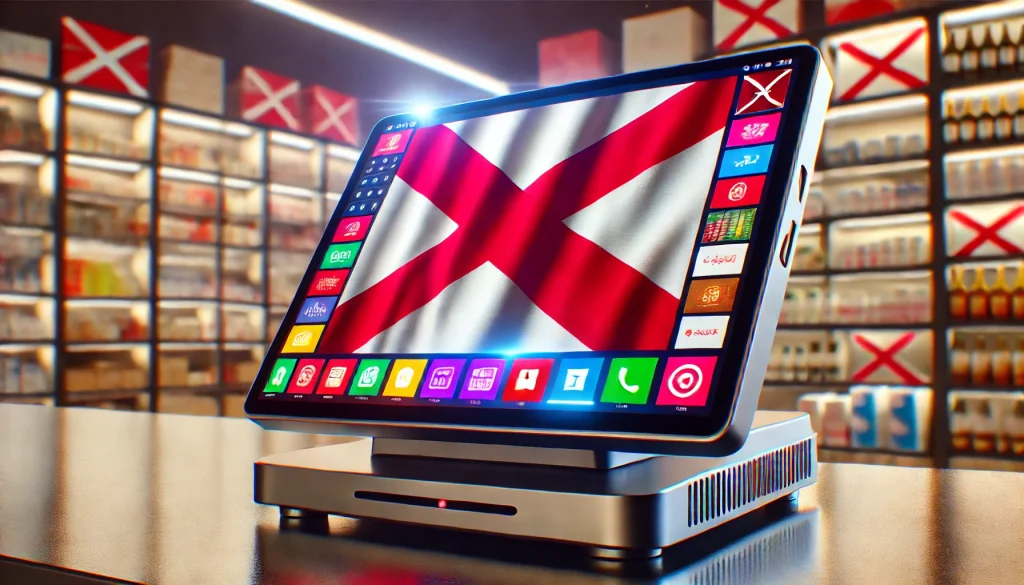In Alabama, from the bustling city of Birmingham to the charming coastal town of Mobile and the vibrant capital of Montgomery, having a reliable and customized Point of Sale (POS) system is vital for streamlining business operations and enhancing customer service. Whether you operate a retail store, a restaurant, or any other type of business, a tailored POS system can improve efficiency, accuracy, and customer satisfaction. At POSInventorySystem.com, we specialize in providing customized POS solutions for businesses throughout Alabama. This guide will cover essential aspects of POS installation, training, and optimization. For personalized assistance, call us at +1-800-434-9026.
1. The Importance of a Tailored POS System for Your Business
A customized POS system provides several advantages:
- Streamlined Operations: Automate sales tracking, inventory management, and financial reporting to enhance operational efficiency and reduce errors.
- Enhanced Customer Experience: Accelerate transaction times, offer personalized service, and support various payment methods to improve customer satisfaction.
- Accurate Data & Reporting: Access real-time insights into sales trends, inventory levels, and customer behavior to make informed decisions.
- Compliance & Security: Ensure compliance with industry standards and protect customer data with secure payment processing systems.
2. Installing Your POS System
The installation process for a POS system involves several critical steps:
a. Needs Assessment:
- Assess your business’s specific requirements, including inventory size, transaction volume, and integration needs with other systems (e.g., accounting software, CRM).
b. Hardware Selection:
- Choose the appropriate hardware based on your business type. Options may include:
- POS terminals with touchscreens
- Barcode scanners
- Receipt printers
- Mobile POS devices
- Secure payment terminals
c. Software Installation:
- Install and configure POS software tailored to your business needs, integrating features for inventory management, CRM, and reporting.
d. System Integration:
- Integrate the POS system with other essential business tools, such as accounting software and e-commerce platforms, to ensure smooth data flow and operational efficiency.
e. Testing & Calibration:
- Thoroughly test the POS system to ensure all functionalities, including payment processing and inventory management, work correctly. Make necessary adjustments before going live.
3. Training Your Staff
Effective training is crucial for maximizing the benefits of your POS system. Here’s how to train your staff:
a. Comprehensive Training:
- Provide detailed training sessions covering essential functions, including transaction processing, inventory management, and CRM features.
b. Hands-On Practice:
- Allow staff to practice using the POS system in a simulated environment to build familiarity and confidence.
c. Advanced Training:
- Offer advanced training for managers and key personnel on features like reporting, analytics, and troubleshooting to fully utilize the system’s capabilities.
d. Ongoing Support:
- Ensure continuous support and updates from your POS provider, especially when new features or software updates are introduced.
4. Leveraging the POS System for Improved Sales and Customer Engagement
A well-implemented POS system can enhance various aspects of your business:
a. Inventory Management:
- Use the POS system to monitor inventory levels, automate reordering, and analyze sales trends to maintain optimal stock levels and reduce waste.
b. Customer Relationship Management (CRM):
- Utilize CRM features to track customer preferences, purchase history, and loyalty programs. Use this data to offer personalized promotions and improve customer engagement.
c. Sales Reporting & Analytics:
- Access detailed sales reports and analytics to identify trends, manage peak sales periods, and address underperforming products.
d. Marketing & Promotions:
- Implement targeted marketing campaigns based on customer data. Use promotions, discounts, and loyalty rewards to drive sales and retain customers.
e. Multi-Channel Integration:
- For businesses with both online and offline operations, ensure your POS system integrates with your e-commerce platform to synchronize inventory and sales data across all channels.
5. POS Systems for Different Types of Businesses in Alabama
Our POS solutions are designed to meet the needs of various businesses across Alabama:
a. Retail Stores:
- Manage inventory, track sales trends, and enhance customer service with a POS system tailored for retail operations.
b. Restaurants & Cafes:
- Streamline order management, improve service speed, and manage inventory efficiently with a POS system designed for the food and beverage industry.
c. Salons & Spas:
- Enhance client experiences with features for appointment scheduling, CRM, and retail management, all integrated into a single POS system.
d. Fitness Centers & Gyms:
- Manage memberships, track attendance, and handle retail sales with a POS system suited for fitness businesses.
e. Hospitality & Lodging:
- Deliver exceptional guest service with a POS system that integrates room bookings, service management, and billing.
f. Healthcare & Medical Offices:
- Ensure compliance, secure patient data, and streamline billing with a POS system designed for healthcare settings.
6. Conclusion
A customized POS system can significantly enhance your business operations, improving efficiency and boosting customer engagement. By carefully installing, configuring, and training on your POS system, and by leveraging its full range of features, you can achieve greater success and profitability.
For more information or to get started with a customized POS system for your business in Alabama, visit POSInventorySystem.com or call us at +1-800-434-9026. Our expert team is ready to help you optimize your business operations and achieve your goals.

